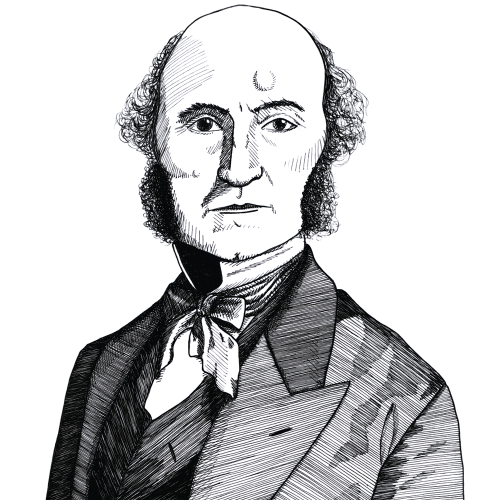Liberty Matters
About Mill’s ‘Socialism’
 First, Mill did not let the cat out of the bag that there were iron laws of production but no similar laws of distribution. Making such a common-sense distinction explicit did not invite others to nationalize industries or introduce central planning. Mill is not the father of socialism. He is amongst socialism’s greatest enemies, in spite of what he might have said himself.
First, Mill did not let the cat out of the bag that there were iron laws of production but no similar laws of distribution. Making such a common-sense distinction explicit did not invite others to nationalize industries or introduce central planning. Mill is not the father of socialism. He is amongst socialism’s greatest enemies, in spite of what he might have said himself.By insisting that there were laws of economics, Mill was explaining that there were limits to what could be done by political decree. Economic laws are no different from the law of gravity. They provide a theoretical structure of forged steel that determine what cannot be done and guidance towards an understanding of how economic policies must be designed if they are to create wealth and prosperity.
Mill’s four propositions on capital provide some of these laws. Economic growth requires increased investment. Increased investment requires increased saving. Employment cannot be increased by increasing aggregate demand. These were constraints against which policy has to be framed.
Mill was writing in the middle of the 19th century. He had never actually seen a socialist economy in existence. What is therefore remarkable is that he was as explicit as Ludwig von Mises, who had seen such things, would one day be about the impossibility of running a successful economy from the center.[58] Instead, Mill wrote, "laissez-faire, in short, should be the general practice: every departure from it, unless required by some great good, is a certain evil.”
Both Richard Ebeling and Nicholas Capaldi have noted Mill’s emphatic opposition to individuals voting for a living. I see Mill’s “socialism” as an early advocacy of the welfare state, in which the rules of the game were designed so that individuals could become productive and to that end might be assisted by actions taken by government. He left the question of the practicalities of socialism open as a matter of trial and error but cannot, in my view, be implicated as a defender of socialism in any of the forms ever experienced since his time.
This is the crucial point: there are some actions that cannot succeed because they are contradicted by economic laws. Therefore, if they are tried, they will not achieve their aims but will, instead, cause economic conditions to become worse.
Mill is very specific about a number of such economic laws that rule out many of the policies advocated by modern Keynesian macro models. Mill gets these things right, while Keynes, along with much of modern macroeconomic theory, gets them wrong. Indeed, I go further. I argue that not only are Mill’s conclusions right, so too is his reasoning. In my view, you will learn more about how to manage an economy successfully by studying Mill than from any modern-day Paul Samuelson clone.
Endnotes
[58.] See, Ludwig von Mises, Socialism: An Economic and Sociological Analysis, trans. J. Kahane, Foreword by F.A. Hayek (Indianapolis: Liberty Fund, 1981). </titles/1060>.
Copyright and Fair Use Statement
“Liberty Matters” is the copyright of Liberty Fund, Inc. This material is put on line to further the educational goals of Liberty Fund, Inc. These essays and responses may be quoted and otherwise used under “fair use” provisions for educational and academic purposes. To reprint these essays in course booklets requires the prior permission of Liberty Fund, Inc. Please contact oll@libertyfund.org if you have any questions.